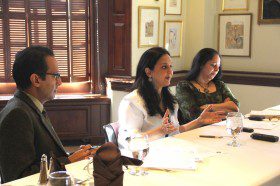By Abhishek Rahman, MDiv Candidate, Harvard Divinity School
Are corporations improving their environmental, social and governance footprint? According to the panelists at a SAI Special Event on November 18th titled ‘The Use of Philanthropy and Corporate Social Responsibility for Social Change in South Asia and the US,’ there is good reason to be optimistic, though there is much work to be done.
Moderated by Alnoor Ebrahim, Harvard Business School, the event, which took place at the Harvard Faculty Club, highlighted models of philanthropy and corporate social responsibility in India and the U.S. and included panelists Rohini Nilekani, chairperson of Arghyam Foundation, and Geeta Pradhan, an executive at the Boston Foundation.
Drawing from their diverse experiences in the private and public sector, the panelists agreed that progress in the field of philanthropy and corporate social responsibility in the past decade has been driven by a combination of evolving global guidelines, increased stakeholder expectations, and more demanding corporate disclosure requirements.
Recalling her personal trajectory in the social sector space, Nilekani talked about how the definition of philanthropy in India has changed from “having a big heart to now having big wealth.”
Commenting about the influence of her left-of-center political beliefs on her philanthropy, she told the audience, “I believe, in a country like India, only when we build a strong society or samaj, can development happen. So, I spend my philanthropic capital to build people’s institutions, which can resist the oppressive forces of the state and the market.”

The definition of philanthropy in India has changed from “having a big heart to now having big wealth,” said Nilekani
For Pradhan, it was her first encounter with poverty in the US that drew her into the philanthropic world: “I realized that poverty in the US wasn’t about deprivation but about a sense of hopelessness,” she said. Both panelists agreed that philanthropic capital should go where the markets will not go, and where the state cannot go.
While discussing trends in philanthropic giving in the US, Pradhan cited that, “95% of U.S. households’ giving is philanthropic, and the total giving in the US is $335 billion, or 2% of the nation’s gross domestic product.”
Pradhan said that individuals like Nilekani are the biggest givers to philanthropic causes while “foundations and corporations only constitute 15% and 5% of the total philanthropic effort respectively.”Both Pradhan and Nilekani agreed that individuals who give to philanthropy are more focused on the impact of their philanthropic efforts compared to the aid from foundations and corporations.
According to the panelists, this trend helps in assessment but poses challenges by forcing metrics on unquantifiable factors such as inclusion and rights-based issues.
Although the panelists shared many arguments for how effective philanthropy is, they also discussed challenges which remain in building transparency and accountability in giving across sectors. According to Nilekani, “there is a need to build professionalism around philanthropy and an ecosystem to match people and organizations who are giving.”
Both Nilekani and Pradhan agreed that it is everyone’s responsibility to make philanthropic giving and corporate social responsibility more effective.
“If there is to be any hope of achieving the type of systemic change that is needed to tackle increasingly complex social, environmental and governance challenges, then our action must be as thorough as it is constant,” Pradhan said.
Full video:

